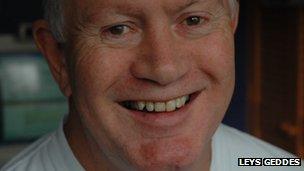Roy Hodgson: Is it wrong to mock the way he speaks?
- Published
- comments

There's been furious debate over newspaper headlines highlighting England manager Roy Hodgson's pronunciation of the letter "r". So is it inappropriate to make fun of this?
For several years headline writers have jovially referred to Roy Hodgson as "Woy".
On Wednesday, a Sun newspaper headline was the source of complaints to the Football Association and the Press Complaints Commission.
Hodgson's pronunciation is a form of rhotacism - shared by politician Roy Jenkins and broadcaster Jonathan Ross.
Ross told the Sun newspaper: "I can see it's a joke, everyone can see it's a joke. Life's too short."
And fans at Hodgson's former employer, Fulham FC, had an affectionate banner bearing the legend "In Woy We Twust" without ever drawing the same criticism.

Roy Hodgson pronounces his "r" differently to many
So is it acceptable to mock how people speak?
"It sends a really worrying message that it's OK to poke fun at some people if they sound slightly different," says Claire Mitchell, a speech and language therapist based in Manchester.
Mitchell, who has been working with people with speech difficulties for the past 17 years, was concerned about the possible knock-on effect.
"Nobody wants to be the one without a sense of humour but where do we draw the line? What are the implications? Will it make people more likely to be bullied?
"What about a child in the school playground?"
Although Hodgson's way of speaking has been widely described as an "impediment", Mitchell points out that "rhotacism" is not classed as an impairment. Instead, it's merely a variation in use of "r".
There is no real difference in the way Hodgson says the words "range rover" than a person with an Irish, American or French accent who uses another, slightly different variation of the sound we associate with an "r".
So if it's simply a variety of pronunciation, rather than an impediment, is it open season for humour?
In his blog, children's' book author Michael Rosen wrote: "Many of the comments that people make about other people's speech are really comments about the status of one's own speech or the perceived status of what sounds educated."
He says that a great deal of comments about non-standard ways of speaking are "prejudiced" and can make people feel "self-conscious and inadequate" if they don't conform to the norm.
Even though Hodgson does not have a speech impediment, Leys Geddes, chair of the British Stammering Association feels that the general attitude towards people who do is unhelpful and "wrong".
Geddes feels that people don't understand the day-to-day difficulties that people with speech impediments face when trying to communicate.
"People think it's OK to take the mickey out of speech impediments. They don't with other disabilities, it's a no-go area. They don't understand what it is like when you struggle to speak, how tiring it is physically and emotionally."
While the newspaper mockery is not of a genuine speech impediment, for some there's a sense that it might encourage that type of behaviour.
"That article in the Sun gives people permission to behave like that," says Geddes.
Geddes is 63 and has been struggling with a stammer for most of his life, and his speech problem even cost him his job in marketing when he was in his thirties.
And of course, the consequences for any children who pronounce an "r" in the same way as Hodgson could be unpleasant.
"Jonathan Ross may not mind having his rhotacism mocked, but the average child will," Geddes argues.
Making fun of stammering was once common, with Ronnie Barker's grocer Albert Arkwright in Open All Hours a classic example.
Now many comedians would consider openly mocking a stammer to be in poor taste. Times change.
Stand-up comic Tony Jameson, who has an occasional, slight stammer, says that if a comedian has a structure and a routine that includes someone who speaks in a different way, it can be sometimes be acceptable.

Leys Geddes says mocking Hodgson's speech may make life harder for children who speak similarly
But he thinks it is "unfair" solely to poke fun at people with speech impediments and making fun of it in isolation is "lazy".
There will be plenty of people who think the row overblown. As Ross said: "Really it's not a big deal. I wish we weren't part of such a judgemental culture."
In the meantime, Geddes thinks that solely concentrating on how people speak distracts from the message they are trying to communicate.
"The important thing is not how you say things but the things you say."